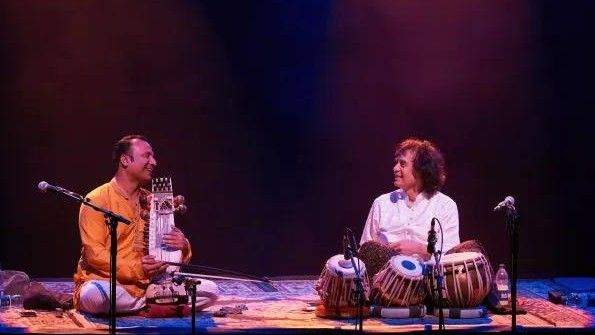
Sarangi player Sabir Khan has had a 21-year association with tabla maestro Ustad Zakir Hussain, accompanying him at his solo recitals or in larger group settings. He says, “It began when my father, Ustad Sultan Khan, was having health issues, and Zakir saab requested him if I could play with him.”
The instrumentalist is still trying to come to terms with Hussain’s death in San Francisco on December 15. Though he was aware of the Ustad’s health status during the past few weeks (he had been diagnosed with idiopathic pulmonary fibrosis), the news came as an irreparable shock. “My parents raised me, and my father initiated me into music and taught me, but Zakir saab mentored me and showed me the way,” he says.
Khan points out that he is from the third generation from the family to perform with Hussain. He elaborates, “Zakir saab told me how he played with my grandfather, Ustad Gulab Khan. His association with my father lasted 33 years. He was with my father through his ups and downs, made the challenging times good. Thus, my father gave him full freedom in how he wanted to nurture me.”
Besides his father, Khan learnt from his uncle Ustad Nasir Khan. According to him, Hussain helped him understand what was good and what was not. “He taught me how to see the good in music, and choose the right platforms. I won’t get over this loss easily, as whenever I play, I will think of him. The way he loved other musicians, his fans and his family was something unique. He had a huge heart, and was very caring,” he says.

Khan belongs to the ninth generation of a family of Sikar gharana musicians from Rajasthan. He says, “Many of them were court musicians who played sitar, sarangi, pakhawaj and tabla. The sarangi players remained most prominent. They slowly moved to other places of Rajasthan. Our family came to Jodhpur, where I was born, but eventually shifted to Mumbai.”
Talking of his upbringing, Khan says he was lucky to be born in a maestro’s house. He recalls, “As a child, I would meet Lata Aunty, Ashaji, Khayyam saab, Ustad Nusrat Fateh Ali Khan saab, Ghulam Ali saab, Ustad Allarakha saab, Zakir Hussain saab, Shobha Gurtuji. Somewhere I received their blessings. They would see me play when I was young and encourage me.”
He attended his father’s shows, and wanted to play like him. He says, “I would get gooseflesh when I heard him, and my favourite raag was Jog. I would say either I play like that or not play at all. In fact, whatever raag he played, I would come home and practise that. That passion to discover things was there. Those days, there was no social media. We would listen to music on cassettes, but unlike today, it was difficult to get everything. So I was selective in what cassettes I wanted to buy, and would listen closely and do riyaaz. A lot of learning would also happen on stage, when I played with my father, Zakir saab or any other senior artiste.”
Besides Hussain, Khan has accompanied other tabla players like Pt Anindo Chatterjee, Pt Kumar Bose and Pt Swapan Chaudhury. He has also enjoyed playing with vocalists Ustad Rashid Khan and Kaushiki Chakraborty, besides ghazal singers Ghulam Ali, Pankaj Udhas, Jagjit Singh and Talat Aziz. On the film front, he cites his work in Saawariya, Dangal, Jodhaa Akbar and Badlapur as his favourites, and has worked with A.R. Rahman, Pritam, Vishal Bhardwaj and Salim-Sulaiman.
According to Khan, the sarangi has come to be recognised because of its closeness to the human voice. “Old-timers often said if one wants to learn singing, one should learn the sarangi first. They said that if one wanted to do riyaaz, it was best to be accompanied by a sarangi player,” he says.
Asked why some musicians, specially vocalists, prefer to have harmonium accompaniment, Khan says it’s a matter of choice. “Both are beautiful to hear in their own way. Of course, sarangi has existed from before, and earlier concerts would have two sarangi players. Then because of budgets, only one sarangi player was used. Harmonium has become popular over the last 70 or 80 years. In a harmonium, chances of going off-key are less. Sarangi needs technical expertise to play passages like meend and gamak. Yet, for the main artiste, it depends on what they are comfortable with.”
Khan says there was a certain understanding on stage whenever he played with Hussain. “Because I was mentored by him, I would know that every time, I would learn something new. One thing he would always say, and that’s something my father also said, was that one should be an artiste for two hours and a good human being for the other 22 hours. That makes a difference. That’s something I will try to follow,” he concludes, his voice quivering with emotion.